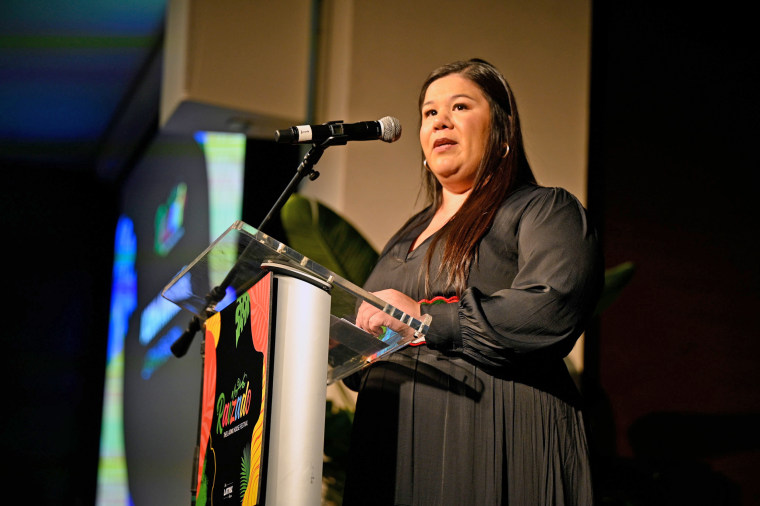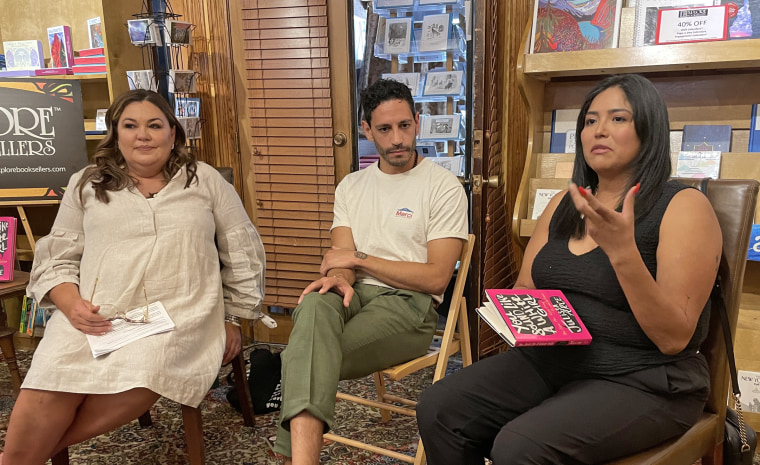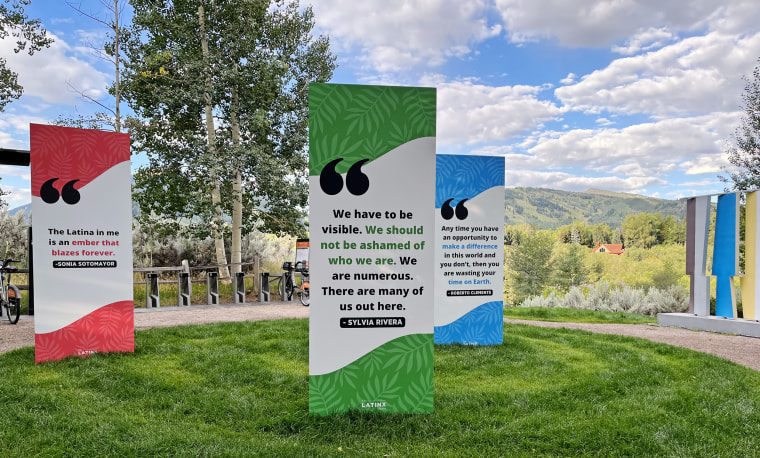ASPEN, Colo. — A few hundred Latinos are filling a playground of the wealthy this week with their intellectual thoughts and cultural celebration, staking a claim in a place where they are often invisible or absent.
Brightly colored displays of pink, turquoise, yellow and rose lit up the forested landscape of a luxury resort that was transformed into the first Raizado ("rooted") festival.
“I’ve been to this space many times, many conferences, many seminars. This is probably the most Latinos who have shared this very space, this very room, this very hotel, this very property, this very city,” said Alex Sánchez, the executive director of Voces Unidas, an advocacy group for Latinos in the region known as Roaring Fork Valley.
The festival, which runs through Friday, is in the hometown of the 60-year-old Aspen Ideas Festival, which brings together thought leaders, writers, artists and others. Historically, it has not had a heavy Latino focus or presence.
Mónica Ramírez co-founded the organization Latinx House in 2019 at the Sundance Film Festival to ensure a Latino presence there and at other high-profile events. Amid the coronavirus pandemic, that work evolved into Raizado, a $2 million event in its inaugural year, an event spokesperson said.
“It became acutely clear that we couldn’t just show up in places of consequence. We had to create them,” she said.

Often, Latino people at the resort are its workers. A Latina who was cleaning rooms during the festival told NBC News in Spanish, “Never have I seen so many of our people here.”
Aspen is too expensive for many of the resort’s workers, Sánchez said. So most Latinos live in communities nearby, some commuting several hours to work each day. Latinos, he said, are about 35% of the greater Roaring Fork Valley in western Colorado. Many are immigrants or their children, Sánchez said.
The festival was extended a day to invite the public, and 40 of the 250 festival tickets were reserved for the Latino workers.
“We have an opportunity, unlike many other festivals, unlike many other events that happen in Aspen, where Latinos and Latinas, the sons and daughters of the very people cleaning the rooms today, cooking of our food, managing our properties, both in the back and front, rarely get a chance to participate,” Sánchez said.
His group, formed in 2020, does the largest Latino/a polling in Colorado, as a service to Colorado Latinos, he said. The group’s polling of 1,000 Latinos found that Latinos in the Western Slope of Colorado, regardless of political affiliation or leaning, were more likely to express experiencing discrimination than Latinos in other parts of the state, he said.
“Western, a lot more conservative; you also have pockets, the Aspens, Vails, and other places where Latinos and Latinas oftentimes see themselves as not integrated and not part of the community,” Sanchez said. “We are the workforce, but not seen reflected in mayors, or city councils or school boards or as local representatives, and sometimes, we’re in jobs that are lowest paid with the least amount of safety nets.”
That said, Latinos in the region have seen the first Latina elected to a Roaring Forks school board, where 60 percent of the children are Latino, he said.
The area also helped the first Latina, Elizabeth Velasco, win a major party primary, Democratic, in a statehouse race. She faces incumbent Republican Perry Will in the redrawn district. If elected, she would be the first immigrant and first Latino/a elected from the western slope in the history of the state, Sanchez said.
Coming together 'to change things'
To honor the Latino community, Mariachis Las Campanas de America from San Antonio led attendees on a procession to a creek on the property, and attendees tossed in marigolds.
Rep. Joaquin Castro, D-Texas, spoke before the procession remembering Latinos who died of gun violence, some in shooting massacres at the Pulse nightclub in Orlando, Florida, in a Walmart in El Paso, Texas, and in classrooms at Robb Elementary School in Uvalde, Texas.
Latinos came together at the festival “to change things and to make a difference,” he said.
“I fundamentally believe right now that Americans don’t know who Latinos are, because our stories and our histories have not been told,” Castro said. “Being unknown is not only culturally insensitive; it is dangerous. But Latinos aren’t without power or agency.”
The event featured a variety of discussions on such topics as education, building wealth, erasure of Latino identity, representation in publishing, Hispanics in philanthropy and more, all through a Latino lens.
The event is meant to draw more investment to the Latino community, too.

Carmen Rojas is the CEO and president of the Marguerite Casey Foundation, one of the event’s lead sponsors. Rojas, one of the speakers Wednesday, is the only Latina leading a major philanthropic foundation that gives $40 million to $60 million a year across the country.
Under her leadership, the $1 billion foundation has increased how much it gives Latino groups so the amount is a third of its “giving” budget, she told NBC News.
“I think money conversations are moral conversations, like how we spend our money, our public dollars, our private dollars, corporate giving tells us who we value and what we value as a society,” she said.
Organizers directed some of the funding to Latino-owned and -operated businesses, hiring Latino chefs, hair and makeup artists for speakers, visual artists, food and refreshments and interpreters, to name a few.
Celebrities dotted the event, including Mauro Castillo, a Colombian singer and musician who was one of the singers of “We Don’t Talk About Bruno,” the hit song from Disney’s “Encanto,” and the voice of character Félix. Mexican pop star Belinda surprised attendees with a performance.
Lupita Infante, granddaughter of the late legendary Mexican actor and singer Pedro Infante, performed with Mariachis Las Campanas de America.
Thursday’s agenda included a screening of “The Culture is Latina,” a four-part series created by MSNBC featuring the actor Justina Machado. MSNBC and NBC News share the same parent company, NBCUniversal.
The event has a clearly progressive, although not partisan, bent, with support from the Open Society Foundations, the philanthropic network founded by business magnate George Soros. It also is backed by the Ford Foundation.
Ramírez, who said she comes from rural Ohio, said the festival is open to people with diverse views and political leanings.
“What I say to myself when I do my work is ‘what do my neighbors care about, and what can we work on together?’” she said. “How are we making spaces to have conversations to learn and also to challenge each other, because we don’t all agree on all things?”
She said Latinx House has committed to hold Raizado for the next nine years, contingent on financial support.
(Note: NBC News reporter Suzanne Gamboa participated as a speaker on a panel about disinformation and the media.)
Follow NBC Latino on Facebook, Twitter and Instagram.


